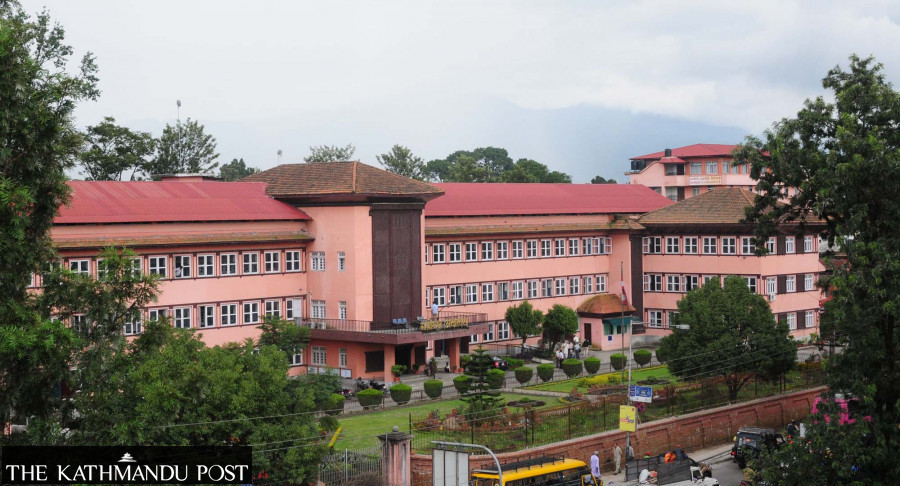Politics
Political parties dragging their feet as key institutions decay
The crisis in the judiciary follows problems in the legislature and the executive.
Anil Giri
After undergoing two unsuccessful dissolutions in six months at the hands of the previous government led by KP Sharma Oli, the revived House of Representatives has been prorogued accomplishing very little under the new government of Sher Bahadur Deuba. No one knows when the House will be back in business.
Deuba, appointed on July 13 as per a July 12 Supreme Court diktat, struggled for three months to give full shape to his Council of Ministers. Governance was badly hit.
On the judiciary front, things are no better. A controversy concerning Chief Justice Cholendra Shumsher Rana has precipitated an unprecedented crisis in the judicial arm of government. Justices and lawyers are up in arms against the chief justice, who has been accused of demanding a share in the Deuba government, a charge that he has denied.
The Supreme Court is now hearing only habeas corpus petitions after it picked no case for days as Chief Justice Rana has come under pressure from fellow judges to quit while the lawyers’ fraternity is on the streets seeking end to rampant anomalies in court.
The government has got full shape but its pace is slow and sluggish.
Amid this, Nepal’s political parties have demonstrated lethargy.
As the crisis in the judiciary is deepening, there are calls from various quarters for political actors to make a move. But key political actors are silent.
Senior Nepali Congress leader Ram Chandra Poudel earlier this week said that the state of affairs is in a very “difficult stage” in the wake of the crisis in the judiciary and non-functional Parliament.
“All vital organs of the state have come under scrutiny. Parliament, constitutional bodies, the executive and the judiciary are not working effectively. Political parties mainly the Nepali Congress, the ruling alliance and the opposition parties should seriously make a move to overcome this crisis. Political parties that are often called the centres of hope are also not doing well as we have seen how the largest communist party has split,” said Poudel.
Besides the chronic instability in Kathmandu, the governments in six provinces except for Province 2 are also becoming sources of instability. The main opposition CPN-UML that used to lead four provincial governments has lost all chief ministers from Tuesday after Bhim Acharya of Province 1 resigned from the post on Monday. Rajendra Rai of the Communist Party of Nepal (Unified Socialist) has replaced Acharya. In Karnali also, Mahendra Bahadur Shahi of the Maoist Centre has been replaced by Jeevan Bahadur Shahi of the Nepali Congress as chief minister. Bagmati has seen three chief ministers in the last three years.
“Political forces that earlier stood for change and came together to promulgate the constitution in 2015 should come forward to resolve the present crisis,” said Daman Nath Dhungana, a former House Speaker. “But those actors who came together to bring the change are dispersed.”
According to Dhungana, the source of all ills lies in the defective constitution.
Just like the erstwhile KP Oli government, which was criticised for governing through ordinances, Sher Bahadur Deuba too has been introducing ordinances one after another.
As agitation continues in the Supreme Court, ordinary people are deprived of justice and political leadership from the ruling and the opposition benches are divided on how to defuse the ongoing tension in the judiciary.
Though some political party leaders have expressed their eagerness to defuse the ongoing tension in key state organs including the judiciary, they have yet to sit together and find a way out.
A senior Nepali Congress leader said parties were waiting for Prime Minister Deuba to return from Glasgow.
Justices who are demanding Chief Justice Rana’s resignation say political parties must take up the case and make a move to impeach him. Parties, however, do not appear keen on doing so.
“Those parties who stood in favour of changes failed to consolidate the achievements and review the weaknesses,” said Ram Karki, a Maoist Centre leader. “Those who are against the hard-fought changes and the present political set-up are uniting. Parties, who brought the changes, are divided. We are in a precarious situation.”
Oli, the UML chair who helmed a government of almost two-thirds majority for three years, had an opportunity to consolidate the achievements and strengthen federalism and constitution. But Oli took steps one after another to attack the system and dishonoured the spirit of federalism.
“We are in a situation where people are wondering if there is a state,” said Dhungana. “Of course the political parties have a major responsibility to fix what’s broken. Our political actors’ silence when the country is in a sorry state is surprising.”
With Supreme Court justices coming under pressure—criticism is mounting as they have not been hearing cases—they want political parties to act. But Rana himself is said to be reaching out to political actors in a bid to save his chair.
Political parties’ failure to act at a time when all key state organs are in a disarray may lead the country towards a failed state, say observers.
“Our political actors have failed to deliver on their promises,” said Mohna Ansari, a human rights defender and former commissioner at the National Human Rights Commission. “The present crisis in the judiciary is an outcome of our political actors’ failure to strengthen institutions.”




 13.12°C Kathmandu
13.12°C Kathmandu














